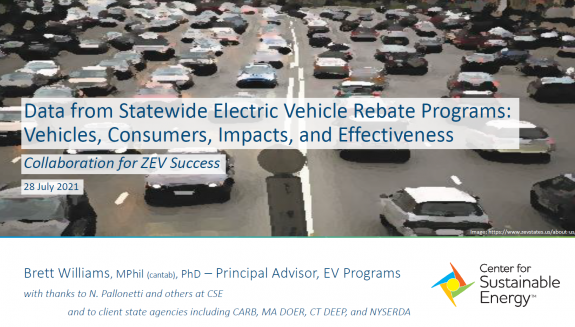Presentation: "Data from Statewide Electric Vehicle Rebate Programs: Vehicles, Consumers, Impacts and Effectiveness"

This presentation was given to the “Collaboration for ZEV Success” hosted by NESCAUM and the Alliance for Automotive Innovation (AAI) for the Multi-State ZEV Task Force.
Invited speaker Dr. Brett Williams, Senior Principal Advisor for Electric Vehicle Programs, outlines life-of-program and calendar-year 2019 metrics for EV rebate programs in four states: California, Connecticut, Massachusetts, and New York.
Some key takeaways:
- Where is the funding going? Most EV rebates go to consumers with moderate incomes and toward moderately-priced vehicles. Several demographics of EV rebate recipients reflect the demographics of new-car buyers.
- What is the path forward? Research can help us grow markets for EVs beyond early adopters, including understanding the motivations of “EV Converts,” who became EV owners despite initial disinterest.
- Are rebates effective? Two metrics indicate rebates are adding EVs to the market in high proportions and point the way toward further reductions in free ridership.
- Are rebates impactful? Replacement rates of older more polluting vehicles are high, typically >80%. Vehicle-replacement and other impact metrics are increasing not decreasing over time -- going against a common paradigm used to think about phasing out policy support for solar and other technologies as market volumes grow.
Read more about:

